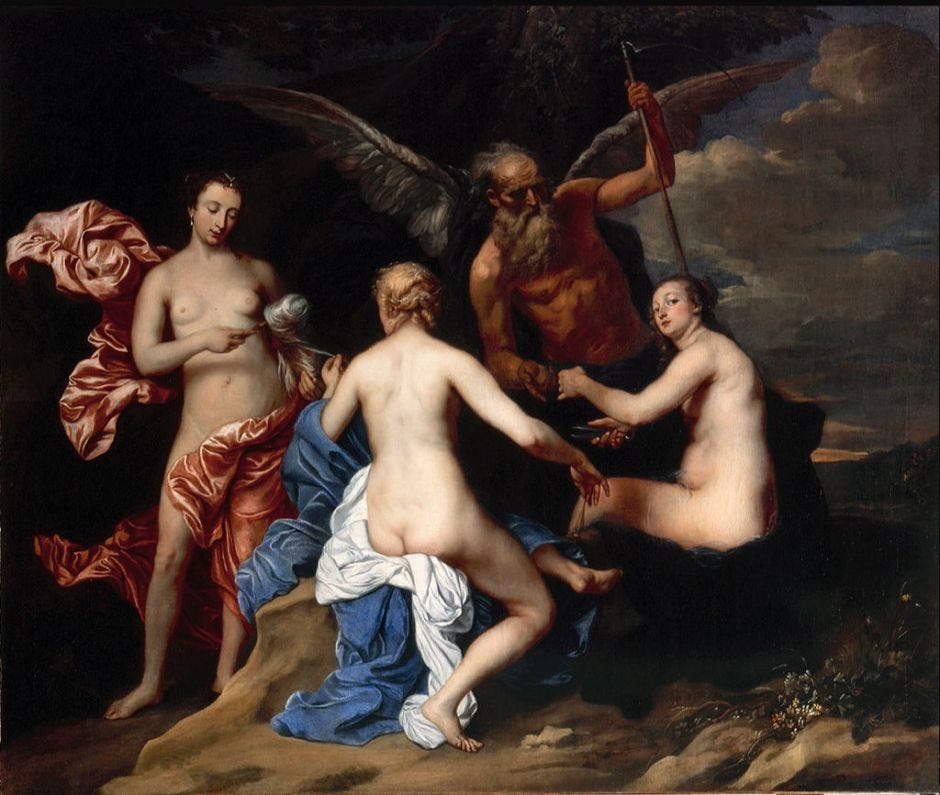Once upon a time, the planets and the fates and all the stars aligned
Deep Dive episode on "Mastermind" out now!
This week we’re going deep into Midnights favorite “Mastermind.” After looking at this Taylor Swift song from the perspective of satire in our previous episode, we take another look to examine what Taylor is actually “mastermind”-ing. Is it a relationship? Or is it a nod to her many (many) easter eggs she leaves her fans? Maansi explores how Taylor weaves strategic language into the lyrics to reclaim the idea that she’s “calculating.” Jodi finds connections to The Odyssey, Oedipus Rex, and Greek mythology to bring this to an AP-level conversation. And Jenn shares more context about why “all the wisest women had to do it this way,” has deep roots in literature and history. Join us as we unpack this cryptic and potentially Machiavellian song!
A Sneak Peek at This Week’s Episode!
This Week’s Extra Credit - Brought to you by Jenn
“Once upon a time, the planets and the fates and the stars all aligned.”
Ah the fates. Yours truly has been both rewatching Once Upon a Time (and I am quite determined to make it through to the end this time, but it’s getting rough) and watching the new Percy Jackson series on Disney+, so the fates are actually a pretty timely topic for me. Fate itself has been a concept for a long time, but the idea of “the fates” gets us into some pretty interesting mythologies.
For many western stories, we see a version of the fates from Greek mythology - three women who measure and cut thread. But we also see the fates in Norse mythologies and even in more Baltic stories. For this week’s extra credit I wanted to dive in deep into these mythologies that Taylor references in the opening line to “Mastermind.” For a song all about manipulation and control, it’s a pretty interesting callout to make. Let’s see why!
The Fates in Greek Mythology
Let’s start with probably the most well known version, the Greek version. To be honest, the real reason I think this is going to be the most well known version of the Fates is because I’m a millennial and my first introduction to this myth was through Disney’s Hercules.
What you don’t see as much in this film is the different roles that each Fate holds. It is very much a team effort between the three of them, so understanding how they all work together is pretty interesting.
Clotho
First, we have Clotho. Clotho would spin the thread of someone’s life before they were born. While individuals had freedom to make certain decisions, Clotho’s spinning set some things in stone. The inevitability of fate was something that could be both reassuring or discouraging.
Fate meant Odysseus would return home to Ithaca, despite Poseidon's attempts to stop him. However, that same concept of fate meant that Oedipus was fated to marry his mother and kill his father. Before Odysseus and Oedipus were born, Clotho wove those inevitabilities into their lives.

Lachesis
Once Clotho spun the thread of your life, Lachesis would measure it. The length of the thread determined how long your life would be. This one was always particularly interesting to me, because this idea encouraged incredible acts of bravery, especially in battle. If the length of your life is predetermined from the day you are born, trying to protect your life is a waste of time and energy.

Atropos
Then finally we get to Atropos. Atropos is the one who will cut the thread of your life, thus ending it. Not only did Atropos make that final cut, she also decided how you would die. Therefore it was up to her whether you had a glorious death or a shameful one.

As a complete side note, I enjoyed Stephen King’s interpretation of the Fates in a modern world in Insomnia. Check out it if that’s your vibe! If you want to learn more about Greek, Roman, and Norse mythologies, I would suggest starting with Mythology by Edith Hamilton.
Other Myths About Fate
Of course, Greek mythology is only one type of mythology that we have. Norse mythology also has the Norns, which are female beings who are in charge of fate. The Norse version of this is less about the number of fates (although some versions do specify a number), but are rather a whole category of powerful beings themselves. It sounds like they may have some overlap with the Valkyrie perhaps, but regardless, they are powerful, female, and again even the gods are subject to fate.
Other myths include Laima of the Baltic myths. Laima is the goddess of fate who works with Dievs, the god of the sky, and Saule, the goddess of the Sun, to decide how long people will live and what will happen in their lives. Laima is a bit more involved than the other mythological fates because she is in charge of weddings, childbirth, pregnancies, and even decides the lives of plants, animals, and the length of the day. Similar to Laima, the Rozhanitsy were the Slavic deities of fate and pregnancy, marriage, and motherhood.
What These Myths Have in Common
Bringing it back to “Mastermind,” we were wrestling with the idea of agency combined with chance during this episode. The metaphors Taylor uses are all about dominoes and chess, games of strategy where your intelligence plays a key role. However, the song starts by referencing things completely out of any human’s control such as the planets and fates. In fact, in these myths, the Fates are more powerful than the gods themselves. Everyone, from the poorest peasant to the most powerful god, is subject to their fate.
The power of the Fates is clear, but another common thread (see what I did there?) running through these myths is that these incredibly powerful beings are all women. In fact, the medium through which our fate is decided is thread or fabric of some kind. To use spinning thread, weaving fabric, and sewing garments as the process through which life itself is created is an incredibly female-centric image. Obviously women do in fact create life, so that’s not too surprising, but the fact that Atropos (the one who cuts the thread) is also a woman is interesting. It reminds me of the classic mother (and Michael Scott) threat, “I brought you into this world and I can take you out of it.”
Is Taylor using “Mastermind” to put herself in conversation with the Fates? Is she simply appreciating the idea that both the Fates and her own hard work brought her to where she is? I think those are both valid readings of this song! What I love about pausing to go into the history of words or phrases though is that something as simple as “the fates” actually has a rich story of its own. Understanding those stories is both fun but also important to help us understand how our language got to where it is today. In this case, the stories are pretty fun and interesting! If you go back and listen to our deep dive into “Getaway Car,” we discovered some phrases that had less fun backstories.
Language is one of the main ways we understand and navigate the world. Knowing the stories of the words we use helps us be more thoughtful, intentional, and effective communicators ourselves. Taylor is carrying on a long tradition of exploring the impact of fate. Whether or not these stories impact your life or your actions? Well….you’re the mastermind of your own life. You tell me!







